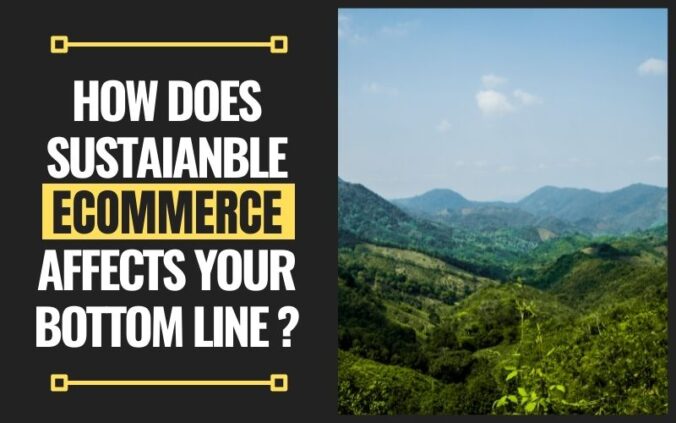The other day, I ordered a pack of two bottles of a health supplement I wanted to try. Two days later, I received a large cardboard box, inside of which was a smaller box between the bubble wrap. And guess what I found inside the small box? Each bottle was individually packaged in another box! It’s not like I ordered fancy crystal wine glasses; all of this packaging was protecting two small plastic bottles. I am grateful some companies are using more sustainable practices, and I am sure this excess use of packaging will make this company lose its most environmentally-conscious customers. But what can businesses do to minimize their impact on the environment? Besides the ethical issue, how does this affect their bottom line?
What online business do for the environment
While ordering almost anything you want from your couch has its massive perks, it also comes with several issues. In addition to the product itself, shipping items requires extra packaging: boxes, packing materials, bubble wrap, etc. In 2019, shipping materials from Amazon orders alone created four hundred and sixty-five million pounds of waste – and the delivery trucks have their own environmental impact too. As explained in my previous articles, companies are starting to improve their practices. They use less packaging or more sustainable, recyclable, biodegradable materials like cardboard. They tend to favor EV vehicles for the final part of the delivery journey or even rely on bikes for the last mile delivery. Some companies also started mentioning the carbon footprint of their products and operations, thanks to some tracking technologies.
In a perfect world, every company would use the most environmentally friendly solutions. But in practice, there are wide disparities between companies’ carbon footprint and efforts to improve it. Costs and complexity are often the main reasons some businesses are reluctant to change. Although that is not always the case, sustainable packaging can be significantly more expensive than traditional materials. Companies using less packing materials face a higher risk of damaged products and customer returns (which is also not very eco-friendly). Using EV vehicles or green alternatives for the last mile delivery sounds great on paper, but in reality, it can make processes much more complex and/or limit the target geographic area.
Customers care about sustainability
Does that mean that being responsible will cause you to always lose money? Of course not. These changes can be a huge selling point for your customers, depending on your offer and target demographic. According to a survey conducted in March 2021, 82% of Millennials and 71% of Gen Z see sustainability as important or very important when shopping online. While what people say can be different from what they actually do, it clearly shows a trend, especially compared to older generations. Of course, it is more complex than that and depends on many other factors. If your target demographics are younger yoga enthusiasts, their behavior and expectations will likely be different than if you were targeting older muscle car fans. While no one will purposely try to damage the environment and enjoy receiving mountains of plastic and cardboard, some customers might be reluctant to spend extra on sustainable packaging. In the age of Amazon Prime, if companies have to charge extra for shipping, they might lose customers. But again, it depends on what the business is selling and who its customers are. Some will be very cost-sensitive, while others won’t care about a small surcharge. A company selling expensive handmade purses can charge a few extra dollars easier than another company selling cheap toys.
These extra costs involved with sustainable practices will vary depending on your business models and the products your company sells. In Europe, Amazon uses cardboard envelopes to ship small flat products, such as books. It does not cost much more to ship cardboard envelopes, books rarely arrive damaged, and the company can advertise its efforts to use recyclable materials. A business selling electronics will most likely need more packing materials to ensure products don’t get damaged, and sustainable alternative packaging can be a significant expense compared to traditional boxes, plastic, and bubble wrap. Companies limiting deliveries to small local areas will have a lower carbon footprint than those shipping worldwide and can use EV vehicles.
Conclusion
While it ethically makes sense to provide sustainable solutions, the impact on a business’s profitability varies greatly. Not every business model is equal, and for some, it will be more difficult to become greener. Overall, and in addition to the ethical reasons, I believe any company should still work towards environment-friendly practices. Not only because customers care more about it but also because it is very likely that we will see new regulations forcing companies to do so. I feel we have reached a stage where a significant portion of customers would stop buying from a company that does not try to limit its impact on the environment – especially when alternatives are becoming more accessible. Finally, this should be a genuine process and not virtue signaling. Advertising the use of recycled materials won’t do much if the product is wrapped in five extra layers of plastic. Many companies are guilty of this and have been heavily criticized on social media.
https://www.emarketer.com/content/sustainability-strategy-will-need-to-have-retailers

